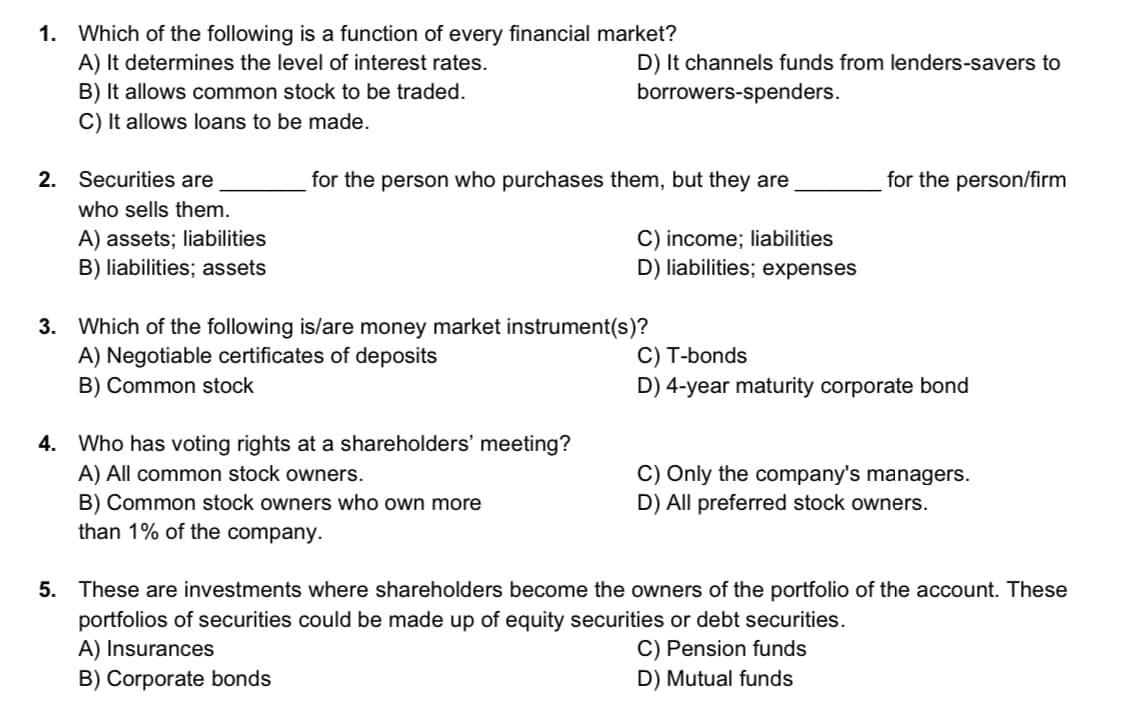1. Which of the following is a function of every financial market? A) It determines the level of interest rates. D) It channels funds from lenders-savers to B) It allows common stock to be traded. borrowers-spenders. C) It allows loans to be made. 2. Securities are for the person who purchases them, but they are for the person/firm who sells them. A) assets; liabilities B) liabilities; assets C) income; liabilities D) liabilities; expenses 3. Which of the following is/are money market instrument(s)? A) Negotiable certificates of deposits B) Common stock C) T-bonds D) 4-year maturity corporate bond 4. Who has voting rights at a shareholders' meeting? A) All common stock owners. B) Common stock owners who own more C) Only the company's managers. D) All preferred stock owners. than 1% of the company. 5. These are investments where shareholders become the owners of the portfolio of the account. These portfolios of securities could be made up of equity securities or debt securities. A) Insurances B) Corporate bonds C) Pension funds D) Mutual funds
1. Which of the following is a function of every financial market? A) It determines the level of interest rates. D) It channels funds from lenders-savers to B) It allows common stock to be traded. borrowers-spenders. C) It allows loans to be made. 2. Securities are for the person who purchases them, but they are for the person/firm who sells them. A) assets; liabilities B) liabilities; assets C) income; liabilities D) liabilities; expenses 3. Which of the following is/are money market instrument(s)? A) Negotiable certificates of deposits B) Common stock C) T-bonds D) 4-year maturity corporate bond 4. Who has voting rights at a shareholders' meeting? A) All common stock owners. B) Common stock owners who own more C) Only the company's managers. D) All preferred stock owners. than 1% of the company. 5. These are investments where shareholders become the owners of the portfolio of the account. These portfolios of securities could be made up of equity securities or debt securities. A) Insurances B) Corporate bonds C) Pension funds D) Mutual funds
Cornerstones of Financial Accounting
4th Edition
ISBN:9781337690881
Author:Jay Rich, Jeff Jones
Publisher:Jay Rich, Jeff Jones
Chapter12: Fainancial Statement Analysis
Section: Chapter Questions
Problem 20MCQ
Related questions
Question

Transcribed Image Text:1. Which of the following is a function of every financial market?
A) It determines the level of interest rates.
B) It allows common stock to be traded.
C) It allows loans to be made.
D) It channels funds from lenders-savers to
borrowers-spenders.
2. Securities are
for the person who purchases them, but they are
for the person/firm
who sells them.
A) assets; liabilities
B) liabilities; assets
C) income; liabilities
D) liabilities; expenses
3. Which of the following is/are money market instrument(s)?
A) Negotiable certificates of deposits
B) Common stock
C) T-bonds
D) 4-year maturity corporate bond
4. Who has voting rights at a shareholders' meeting?
A) All common stock owners.
B) Common stock owners who own more
than 1% of the company.
C) Only the company's managers.
D) All preferred stock owners.
5. These are investments where shareholders become the owners of the portfolio of the account. These
portfolios of securities could be made up of equity securities or debt securities.
A) Insurances
B) Corporate bonds
C) Pension funds
D) Mutual funds
Expert Solution
This question has been solved!
Explore an expertly crafted, step-by-step solution for a thorough understanding of key concepts.
Step by step
Solved in 2 steps

Knowledge Booster
Learn more about
Need a deep-dive on the concept behind this application? Look no further. Learn more about this topic, finance and related others by exploring similar questions and additional content below.Recommended textbooks for you

Cornerstones of Financial Accounting
Accounting
ISBN:
9781337690881
Author:
Jay Rich, Jeff Jones
Publisher:
Cengage Learning

Pfin (with Mindtap, 1 Term Printed Access Card) (…
Finance
ISBN:
9780357033609
Author:
Randall Billingsley, Lawrence J. Gitman, Michael D. Joehnk
Publisher:
Cengage Learning

Intermediate Accounting: Reporting And Analysis
Accounting
ISBN:
9781337788281
Author:
James M. Wahlen, Jefferson P. Jones, Donald Pagach
Publisher:
Cengage Learning

Cornerstones of Financial Accounting
Accounting
ISBN:
9781337690881
Author:
Jay Rich, Jeff Jones
Publisher:
Cengage Learning

Pfin (with Mindtap, 1 Term Printed Access Card) (…
Finance
ISBN:
9780357033609
Author:
Randall Billingsley, Lawrence J. Gitman, Michael D. Joehnk
Publisher:
Cengage Learning

Intermediate Accounting: Reporting And Analysis
Accounting
ISBN:
9781337788281
Author:
James M. Wahlen, Jefferson P. Jones, Donald Pagach
Publisher:
Cengage Learning


Intermediate Financial Management (MindTap Course…
Finance
ISBN:
9781337395083
Author:
Eugene F. Brigham, Phillip R. Daves
Publisher:
Cengage Learning
